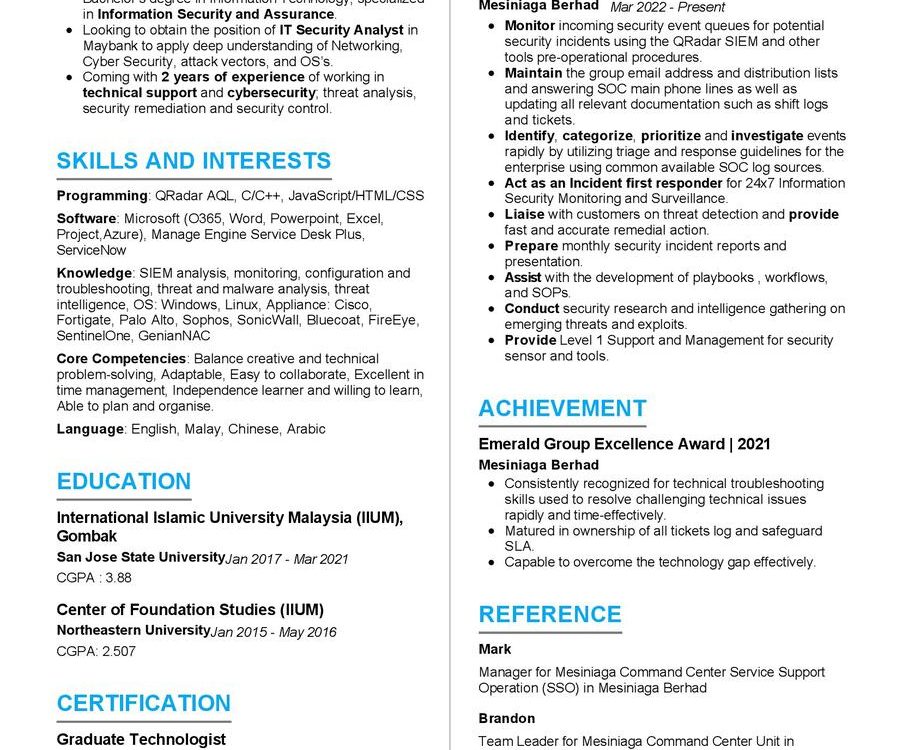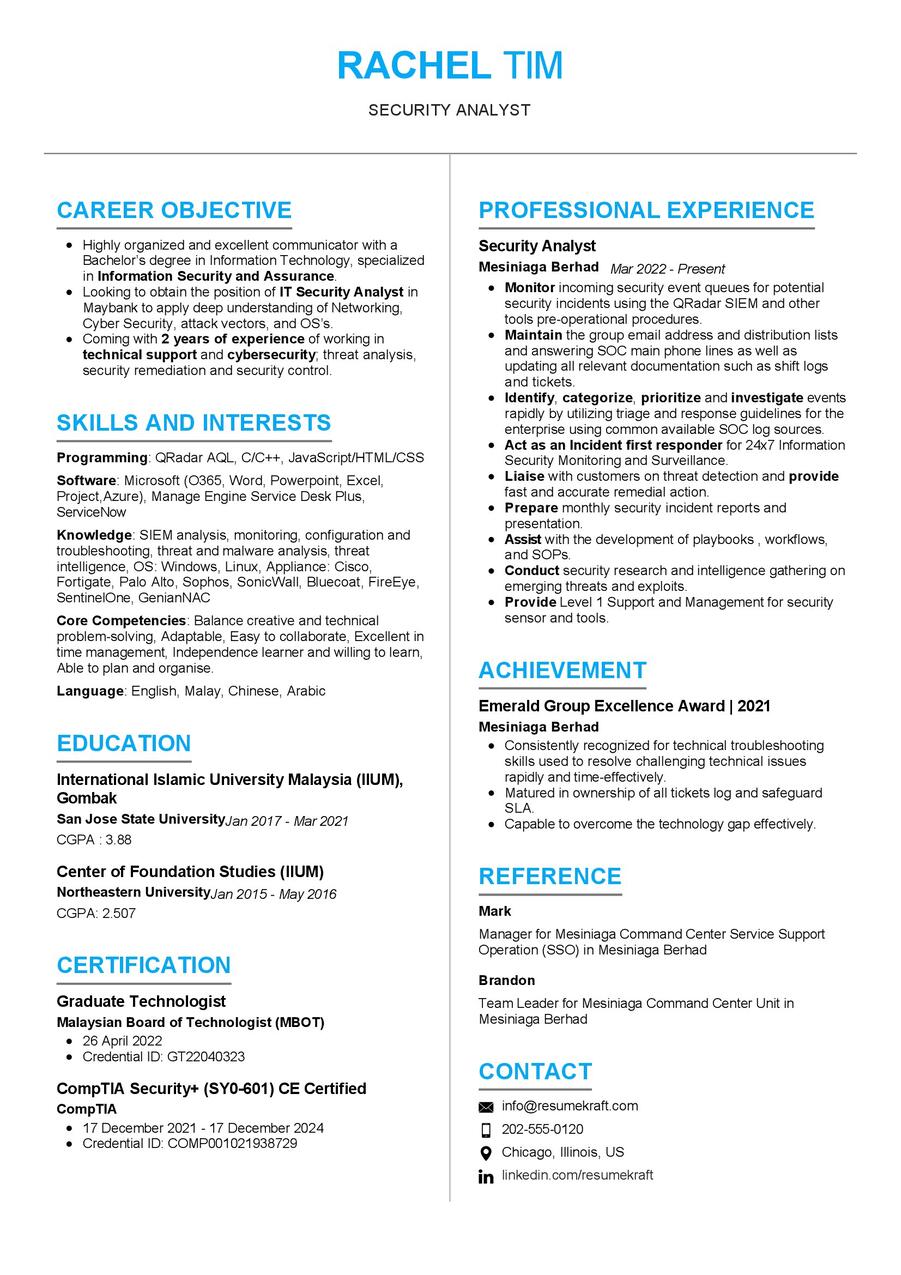Exploring the Role of Security Analysts
In today’s rapidly evolving digital landscape, the role of a Security Analyst has become more critical than ever. Security Analysts play a pivotal role in safeguarding organizations from cyber threats, ensuring the integrity and confidentiality of sensitive information. Let’s delve into the multifaceted responsibilities and qualifications required for a successful career as a Security Analyst.
Understanding the Security Analyst Job Requirements
Becoming a Security Analyst requires meeting specific qualifications to navigate the complex realm of cybersecurity effectively. Here’s an in-depth look at the prerequisites for embracing the role of a Security Analyst:
- A Bachelor’s or Master’s degree in Cybersecurity, Information Technology, or a related field, providing a strong foundation in the technical domain.
- Deep knowledge of cybersecurity frameworks, including a thorough understanding of threat intelligence and risk assessment.
- Hands-on experience in security operations, incident response, and vulnerability management.
- Proficiency in using security tools such as SIEM (Security Information and Event Management) systems, antivirus software, and intrusion detection/prevention systems.
- Strong analytical and problem-solving skills, honed through real-world scenarios and possibly through certifications like CISSP or CISM.
- Effective communication skills to convey complex security issues to both technical and non-technical stakeholders.
- Adaptability to stay updated with the latest cybersecurity threats, technologies, and industry best practices.
Additionally, obtaining certifications like Certified Ethical Hacker (CEH) or Offensive Security Certified Professional (OSCP) can significantly enhance your profile in the competitive field of cybersecurity.
Key Responsibilities of a Security Analyst
The role of a Security Analyst is diverse, encompassing various responsibilities to ensure the organization’s digital assets remain secure. Let’s dissect the core responsibilities that define the role of a Security Analyst:
- Monitoring and analyzing security alerts to identify potential threats and vulnerabilities.
- Conducting penetration testing and vulnerability assessments to proactively identify and address security weaknesses.
- Collaborating with cross-functional teams to implement security measures and best practices.
- Developing and implementing incident response plans to address security incidents promptly and effectively.
- Staying abreast of the latest cybersecurity trends and emerging threats to continuously enhance security measures.
- Conducting security awareness training for employees to promote a culture of cybersecurity within the organization.
- Regularly assessing and improving security policies and procedures to align with industry standards and regulatory requirements.
Each responsibility demands a combination of technical expertise, strategic thinking, and effective communication skills.
Crafting a Strong Security Analyst CV
Your Security Analyst CV is your passport to a successful career in cybersecurity. Here are some tips to ensure your CV stands out in a competitive job market:
- Highlight specific cybersecurity projects you’ve led, showcasing your problem-solving skills and the impact on enhancing security.
- Quantify your achievements, using metrics to demonstrate the effectiveness of security measures you’ve implemented.
- List relevant certifications prominently, emphasizing your commitment to continuous learning and industry-recognized standards.
- Tailor your CV for each application, aligning your skills and experiences with the specific requirements of the job.
Your CV is not just a document; it’s a narrative of your expertise and contributions to the field of cybersecurity.
Security Analyst CV Summary Examples
Your CV summary is the gateway to showcasing your cybersecurity journey. Here are some examples to inspire you:
- “Dedicated Security Analyst with over 5 years of experience, adept at implementing robust cybersecurity measures and leading incident response teams.”
- “Results-driven Cybersecurity Professional with a proven track record in conducting penetration testing and fortifying organizational defenses against evolving threats.”
- “Experienced Security Analyst with a focus on proactive threat intelligence, continuously enhancing security postures to stay ahead of emerging cyber threats.”
Your CV summary is your opportunity to make a strong first impression, capturing the essence of your cybersecurity expertise.
Building a Comprehensive Experience Section for Your Security Analyst CV
Your experience section is the backbone of your Security Analyst CV, providing a detailed account of your journey in the field. Here are some examples to guide you:
- “Led a team in implementing a SIEM system, resulting in a 30% reduction in response time to security incidents.”
- “Conducted penetration testing that identified and remediated critical vulnerabilities, enhancing the organization’s overall security posture.”
- “Developed and delivered cybersecurity training programs, fostering a culture of security awareness among employees.”
Each experience is a chapter in your cybersecurity story, illustrating your contributions and impact on organizational security.
Education Section for Your Security Analyst CV
Your educational background is a testament to your commitment to excellence in cybersecurity. Here’s how you can present your educational milestones:
- Master of Science in Cybersecurity, XYZ University, a journey of advanced learning and specialization, 2017.
- Bachelor of Technology in Information Security, ABC University, laying the foundation for your cybersecurity career, 2015.
- Certified Information Systems Security Professional (CISSP), a globally recognized certification demonstrating your expertise in the field, 2018.
Each educational qualification is a stepping stone, contributing to your expertise as a Security Analyst.
Essential Skills for a Security Analyst CV
Your skill set is your arsenal in the world of cybersecurity. Here are the key skills that every Security Analyst should possess:
Soft Skills:
- Analytical thinking and problem-solving, crucial for identifying and addressing security threats.
- Communication and collaboration, essential for working effectively with cross-functional teams and conveying security issues to diverse stakeholders.
- Attention to detail, a meticulous approach to assessing vulnerabilities and ensuring comprehensive security measures.
- Adaptability and continuous learning, vital for staying ahead of evolving cybersecurity threats.
Hard Skills:
- Proficiency in security tools and technologies, including SIEM systems, antivirus software, and intrusion detection/prevention systems.
- Incident response and vulnerability management, critical for addressing and mitigating security incidents.
- Penetration testing and ethical hacking, to proactively identify and address security weaknesses.
- Knowledge of cybersecurity frameworks and regulations, ensuring compliance with industry standards.
Each skill is a tool in your cybersecurity toolbox, contributing to your effectiveness as a Security Analyst.
Common Mistakes to Avoid in Your Security Analyst CV
As you craft your Security Analyst CV, be mindful of common pitfalls that can impact your chances of securing your dream job. Here are some mistakes to avoid:
- Using generic language, failing to showcase your unique contributions and impact in previous roles.
- Listing duties without highlighting achievements, missing an opportunity to demonstrate your value to potential employers.
- Overloading your CV with technical jargon, making it difficult for non-technical stakeholders to understand your expertise.
- Ignoring the importance of a well-crafted CV summary, a key section that can capture the attention of hiring managers.
- Failing to proofread, potentially leaving errors that can detract from your professional image.
Avoiding these mistakes will help you create a CV that effectively communicates your strengths and experiences in the cybersecurity field.
Key Takeaways for Your Security Analyst CV
As you conclude your journey in crafting a compelling Security Analyst CV, here are key takeaways to keep in mind:
- Highlight specific achievements and projects, showcasing your impact on organizational security.
- Quantify your successes, using metrics to demonstrate the effectiveness of security measures you’ve implemented.
- Emphasize your commitment to continuous learning, showcasing relevant certifications and ongoing professional development.
- Tailor your CV for each application, aligning your skills and experiences with the specific requirements of the job.
Your CV is not just a document; it’s a canvas where you paint your cybersecurity story, a story of growth, learning, and effective security leadership. Best of luck!
Finally, feel free to utilize resources like AI CV Builder, CV Design, CV Samples, CV Examples, CV Skills, CV Help, CV Synonyms, and Job Responsibilities to create a standout application and prepare for the Security Analyst job interview.


